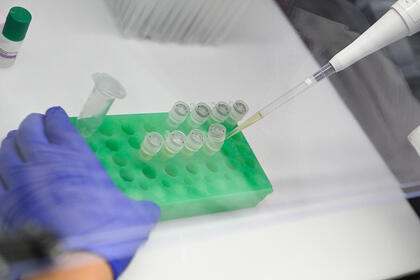The early signs of Alzheimer's disease—more frequent memory loss, increased confusion—can be difficult to detect, often delaying diagnosis. That could change with an inexpensive and noninvasive blood test developed by a team that includes Johns Hopkins scientists and approved by the Food and Drug Administration in May. It's the first test of its kind to get such a clearance and stands to vastly increase opportunities for early detection and treatment.
"This blood test should be a game-changer," said Abhay Moghekar, a neurologist at the Johns Hopkins School of Medicine whose research on identifying biomarkers of neurodegenerative disorders, including Alzheimer's, contributed to the FDA-approved blood test.
Video credit: Aubrey Morse / Johns Hopkins University
Alzheimer's disease, a progressive brain disorder that gradually erodes memory and thinking, affects about 11% of people age 65 and older, nearly seven million Americans. Currently diagnosis involves a series of assessments, sometimes including a PET scan, which can be costly and are available at only a few medical centers across the country. The new blood test, however, will merely require a routine blood draw and could be performed nearly anywhere.
The test is now being rolled out for primary care physicians and specialists to order through their electronic medical record systems, Moghekar said, with commercial diagnostic laboratories in the process of acquiring the necessary kits to process the results.
"Alzheimer's disease impacts too many people, more than breast cancer and prostate cancer combined," FDA Commissioner Martin A. Makary, who spent more than two decades as a member of the Johns Hopkins medical faculty before joining the FDA this spring, said in a statement. He noted that the percentage of people over age 65 with Alzheimer's in the U.S. is expected to double by 2050.
The new test measures the ratio between two proteins found in the plasma of a patient's blood, which reflects the presence or absence of a kind of plaque that's a known marker for the disease. The test isn't a crystal ball, Moghekar said, and it's not something everyone should rush to get—it's only a good fit for people 55 or older who already have some level of cognitive impairment.
Marilyn Albert, a Johns Hopkins neurologist who has studied Alzheimer's for three decades, contrasted the blood test to a PSA test, which is administered regularly to screen for prostate disease.

Image credit: Will Kirk / Johns Hopkins University
"We need people to understand that if you don't have symptoms, you really shouldn't be taking a test of this kind," she said.
Most people who are tested—about 80%—will come away with a "clean yes or no answer," meaning there will be either a very high or very low level of the marker for Alzheimer's, Moghekar said. But the remaining 20% will fall in what he called a "gray zone," meaning more specialized testing would be needed.
The research study that contributed data for the test dates to 1995, when it began at the NIH with 349 people. Hopkins took over the study—known as BIOCARD—in 2009, and the number of participants has since grown to 477, Albert said. Participants come to Johns Hopkins regularly for evaluations that include repeated cerebrospinal fluid and blood sampling, detailed neurocognitive testing, MRIs, and PET scans.
Despite the time-consuming commitment, more than 90% of the original group continue participation, Moghekar said. About three-quarters are participating because they have experienced Alzheimer's in their own families, he added. Participants were enrolled when they were in their 50s and healthy. Now, some are in their late 70s and early 80s, and about a third have some cognitive impairment, he said.
The research is funded by the National Institutes of Health, with infrastructure provided by the Johns Hopkins Alzheimer's Disease Research Center, also funded by the NIH. There has been philanthropic support for the work over the years, which has been very important, Albert said, but about 90% of the funding comes from the NIH. The team is applying to renew the grant in the fall, but those awards have "greatly slowed" amid significant cuts to federal funding for research, she added.
For the scientists contributing to the development of the blood test, there was no breakthrough moment—the research has unfolded over time, gradually and iteratively. It's not a quick process, but it can be gratifying, Albert said.
"You're collecting information. You're hoping that it will be useful. You're learning things as you're going along," she said. "But ultimately you really want to improve the lives of people, and it takes a very, very long time for that to come about."






